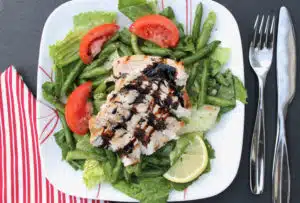Table of Contents
What is inflammation, any way?
When you first started learning about your diet, and how it relates to your health and well-being, you probably remember hearing the word “inflammation” a lot.
What does that word really mean?

In the most general sense, inflammation is the body’s way of protecting itself. If you’ve ever cut yourself, and noticed how the skin gets red and swollen around the injury, that’s inflammation.
Inflammation in action
When your cells are in danger, they send a signal to your immune system. Your immune system then sends its fighter to that area to battle off any foreign invaders and help begin the healing process. Fluid from blood vessels near the area also gets released which causes swelling to occur.
This whole process ensures that your body stays protected and that your wounds heal over time.
The food we eat can also cause damage to our cells. Of course, whole foods, like vegetables, fruits, nuts and seeds, nourish it. But, substances like sugar and alcohol are considered toxins. When we consume them, our body identifies them as things that need to be removed. The inflammation cascade is then triggered.
Acute inflammation vs. chronic inflammation
When inflammation happens normally and occasionally, it’s labeled as acute, and it’s actually very important for your body to undergo this type of stress and response. It ensures that your immune system is healthy and functioning properly.
It’s when inflammation becomes the norm that it becomes dangerous. Chronic inflammation happens when your immune system is basically turned on all of the time. This constant stress on the cells and tissues of your body can lead to any number of disease states.
Causes of chronic inflammation
 There are various causes of chronic inflammation…and many can be attributed to our modern lifestyle. Things like smoking, drinking, obesity, increased stress levels, and increased sugar consumption all can lead to this inflamed state.
There are various causes of chronic inflammation…and many can be attributed to our modern lifestyle. Things like smoking, drinking, obesity, increased stress levels, and increased sugar consumption all can lead to this inflamed state.
Many people could be experiencing chronic inflammation and be totally unaware of it. There are a few signs that your body may be inflamed. These include things like:
- Stubborn belly fat that won’t go away
- You experience frequent fatigue or brain fog
- You have digestive issues such as bloating, gas, or constipation
- High blood sugar levels
- Skin issues like psoriasis or eczema
This is by no means a comprehensive list, and experiencing any of the aforementioned symptoms doesn’t necessarily mean you have chronic inflammation; that being said, if you do experience any of these symptoms, it may be time to re-examine your diet and lifestyle choices.
Paleo for inflammation

The Paleo diet is a great way to battle chronic inflammation because it eliminates many common food offenders such as sugar, refined flours, gluten, dairy, and soy. People experience increased energy, weight loss, clearer skin, stable blood sugar, and improved digestion while following a whole foods based diet like Paleo.
Incorporating antioxidant-rich foods, like fruits and vegetables, will also help tone down the inflammation in your body. Traditional healing foods, like bone broth, should also be consumed when possible.
Self-care and stress-relief techniques should also not be understated. We all carry around loads of stress and it takes a major toll on our body.
Ensuring that we take care of our mental well-being is just as important as our physical well-being.
Eat well. Sleep well. Live well. It seems so simple, but it can be incredibly powerful.